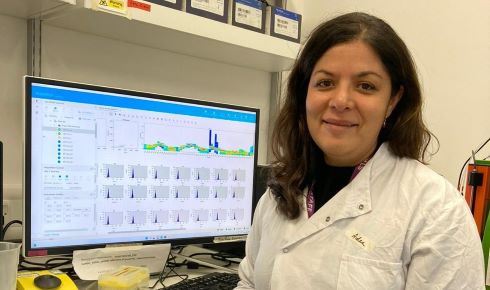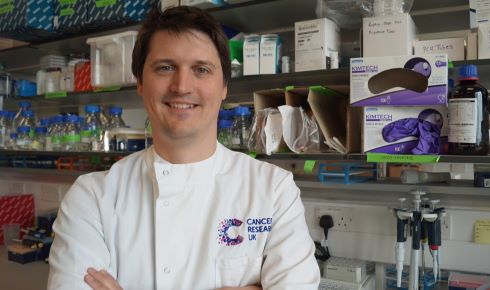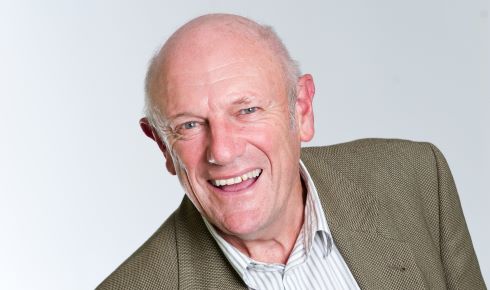Member Profiles
6th December 2024
Our latest profiles explore the working lives of flow cytometrist Aidee Sanchez, Dr Andrew Holding and his work on breast cancer resistance, and Professor Jim Lynch in his wide-ranging interdisciplinary career
A DAY IN THE LIFE
Aidee Sanchez AMRSB on her work as a flow cytometry technician at The Pirbright Institute

I wake up…
At about 06:00 to prepare my son’s breakfast. I then do 10 to 20 minutes of exercise and get ready before my husband takes me to the station to catch the bus to The Pirbright Institute.
I work as…
A technician at The Pirbright Institute, a research centre with the capacity to predict, detect, understand and respond to high-consequence livestock and zoonotic viral diseases. It helps protect our food and economic security and improve the health and wellbeing of animals and people. It is part of the UK Government’s Biotechnology and Biological Sciences Research Council.
On a typical day…
I might be maintaining equipment or training scientists on how to use it, sorting specific cells of interest for an experiment, hosting the equipment manufacturer’s engineers whenever the instruments need to be fixed or maintained, or helping researchers when they have problems with the instruments. I work in the flow cytometry department, which brings together cutting-edge instrumentation and plenty of very experienced people. Flow cytometry uses nanotechnology to count cells, sort different types of cells, ascertain their characteristics, find biomarkers and determine cell function.
The flow cytometer counts and identifies cells by passing a thin stream of buffer fluid, carrying the cells, through a laser beam. Special tubes deflect the light, scattering it at various angles to help identify, for example, specific antigens previously marked with fluorophores. Within a matter of seconds, you can identify different populations, count the cells and do simultaneous analysis of different types of cells. It is very useful in fields such as oncology and haematology.
I enjoy my work because…
There is a lot of variety from one day to the next. I support different teams and research groups across the institute. I meet different people every day and it’s very interesting to learn about the various experiments being conducted by my colleagues.
After work…
I spend most of my spare time being a mum, but I try to go to the gym at least a couple of times per week. At the weekend I go out with friends or try to visit new places.
THE CAREER LADDER
Dr Andrew Holding MRSB on his work researching breast cancer and steroids

I first discovered biology…
When I studied it at GCSE level, after which I set it aside. However, biology and I had a reunion when the ‘omics’ technologies rose to prominence.
I studied...
A standard mix of A levels in maths, further maths, physics and chemistry, followed by a degree in chemistry at the University of Oxford. It wasn’t until the world of chemical biology unfolded before me at the University of Cambridge during my PhD that I started to re-engage with biology. It was my subsequent Fellowship at the MRC Laboratory of Molecular Biology that finally made it clear where my passions lay.
Currently...
I’m leading a research team at the University of York with a keen interest in the steroid drivers behind breast cancer and exploring new avenues related to tumour hypoxia.
I always knew...
That I was drawn to roles that had the potential to improve human lives.
A pivotal point in my career was...
My move to Florian Markowetz’s lab at the Cancer Research UK Cambridge Institute. That was my first time delving into mammalian biology and provided the freedom to build my research programme.
The best thing about my job is...
The science: expanding understanding and methodically addressing complex problems.
This is an interesting area to work on because…
The complexity of cancer biology propels a ceaseless quest for answers. The ultimate aim is to create predictive models for drug perturbation effects and to establish improved treatment strategies.
A key piece of advice would be...
To savour the journey and not focus on the end goals. Life and work are in a state of flux, and finding day-to-day enjoyment in the ongoing process is key to successful research and fulfilling parenthood.
Not many of my colleagues will know...
I stream computer games on Twitch weekly.
In the future, I hope to...
Expand my lab and see through the research proposals in the works. I’m excited by the next set of projects we’re writing proposals for and look forward to the new discoveries they will lead us to.
MY RSB AND ME
Professor Jim Lynch FRSB OBE KHS, distinguished professor emeritus at the University of Surrey, on how the RSB helped develop his career

After graduating in chemistry, I took a PhD and then a DSc in microbiology at King’s College London in 1968, and soon joined the Society’s predecessor, the Institute of Biology, to engage and network with the biology community. I was also one of the first to be awarded Chartered status for chemistry, biology, science and environment.
My whole career has been of an interdisciplinary nature, working in universities, research institutes, government departments and industry, and sustainability has been at the heart of my interests. For 17 years I coordinated the OECD Programme for Biological Sustainability and was Biology President of the International Society of Soil Science, and was privileged to receive the UNESCO Microbiology Prize for this work. This was followed by the award of OBE and other honours including the Freedom of the City of London.
My primary affiliation is always biology, which I have placed at the core of my most recent book, What is Life and How Can it Be Sustained? Reflections in a Pandemic. The RSB has been everything to me in terms of both supporting my career and enabling me to enjoy science.


